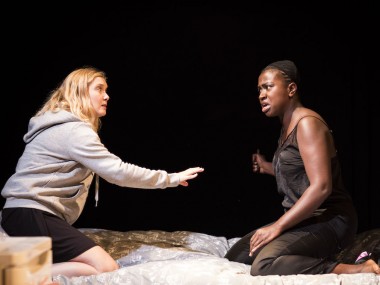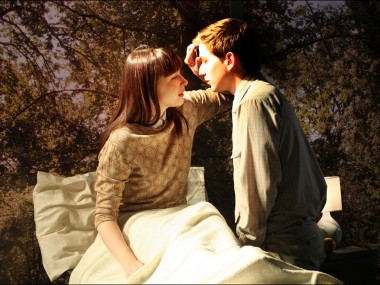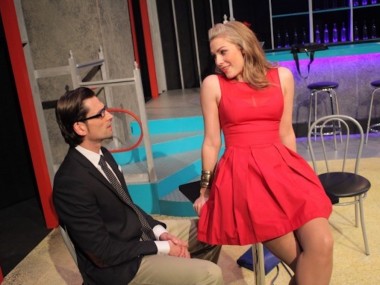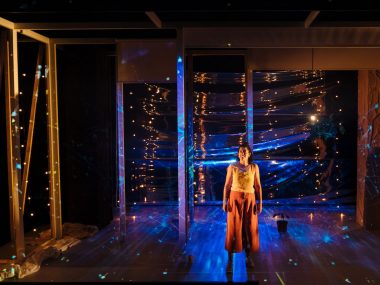Strategic Love Play, Soho Theatre
Thursday 7th September 2023
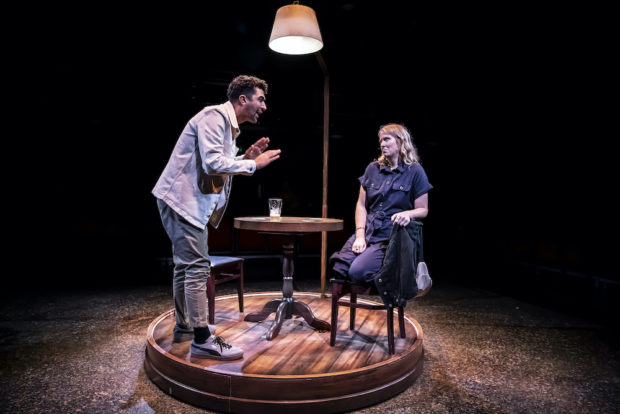
Remember what a first date feels like? Awkward. Exciting. Awkward. Intriguing. Awkward. Difficult. Yes, it’s a mixture of emotions, often between the desire to be liked and the frustration of being unable to connect. Perhaps with the lingering worry of being rejected. Miriam Battye’s Strategic Love Play — which opened in Coventry, moved to Edinburgh and now has come down to London in a Paines Plough touring production — examines these feelings and thoughts in a 70-minute two-hander which mixes laughter with insights into contemporary romance. As you’d expect from the writer of Scenes with Girls, it is, despite some drawbacks, both delightful and a bit bruising.
The situation is a blind date in which the implicitly archetypal thirtysomethings, Man and Woman, aka Adam and maybe Jenny (according to some of the Edinburgh reviews), meet in a bar for a chat which, according to modern conventions, should last at least the time it takes to drink two pints of beer. Battye immediately sets up a tension between him, who is nice and instinctively a bit detached and conventional, and her, who is emotionally full on. She wants to skip the banalities of a first meeting and talk about the truth of emotions; he feels safer by saying the correct things.
It’s an instantly satirical show which both represents gender stereotypes (him strong and silent; her emotionally incontinent) and often subverts them. The Woman’s strategy of blazing away with her feelings, her spiky and sizzling critiques, initially collides with his tactics of smiling a lot and apologizing a lot. But out of this conflict the couple gradually create a rapport as the rituals of dating — talk about work, talk about previous relationships, buying pints, awkward seating — turn into something more interesting and less naturalistic, more of a mutual fantasy session as this couple imagine and explore what a relationship between them might involve, from barbeques to growing old together.
As this summary implies, the energy of the encounter comes first from Woman’s refusal to play nice, and to pout her way through the opening exchanges of the date — she prefers to attack the chit-chat and deconstruct the dating game. Her biting, often humorous, commentary on the platitudes and rituals involved in finding a mate are clearly rooted in exasperation at her recent experiences of blind dates and dating apps. At various moments, we see that she is under pressure from her circle of female friends who are doing their best to “help” her find a suitable partner — a process she submits to, but also rebels against.
At first, Man is on the defensive, wrongfooted by the fiery tone adopted by his date. His dismay at how badly the encounter — the emotional opposite of a meet-cute — started is only gradually transformed into a more confident attitude as he begins to appreciate that Woman just wants him to tell the truth. To drop the little white lies that social intercourse demands on the way to sexual intercourse. As he reveals more about the truth of his own experiences in love he grows into a more sympathetic character.
As an insight into today’s sex war, Strategic Love Play manages to suggest both that nothing much has changed over the years, and at the same time that modern dating is particularly fraught. The generations brought up as digital natives, with the apparently endless choices offered by dating apps and the pressure of Instagramable lifestyles to compete with, struggle with loneliness and rejection. Not to mention sexting, and avatars (Adam’s dating app persona is D). This has always been a factor in growing up in the big city, but perhaps the internet has intensified the pressure to find Mr Right or Cool Girl.
Likewise, male tension around the female demand for truth-telling is as old as the second wave feminist movement of the early 1970s, but as the same time seems wickedly contemporary in the context of today’s desire to be seen to be “nice”. Written in her trademark lively style, with some great aphorisms, Battye’s short play is deliberately unnaturalistic, being more of a dramatized statement about the search for love in contemporary Britain than a play with fully individualized characters. Likewise, her desire to emphasize allusion and ambiguity over cliché gives the story an unsatisfying lack of conclusiveness. The Edinburgh format of short time slots also means that the situation has little room to expand. I wanted to know more about these two characters.
Still, this piece — Paines Plough’s complex co-production with Soho Theatre, Belgrade Theatre and Landmark Theatres — is well directed with clarity and a good pace by co-artistic director Katie Posner, on Rhys Jarman’s circular, and occasionally rotating, set. (There are also some sweet and quirky stage effects involving a crisp packet and a light fitting.) Both Letty Thomas and Archie Backhouse perform the text with pinpoint precision; both allow concealed vulnerabilities to peek out beneath their dating personas (her aggressive “front” gradually weakens). As his nice-guy image and her “difficult” personality modulate through the course of the play, there’s a good deal of onstage chemistry between them. Both pain and pleasure. It remains, however, a rather slim evening, perhaps too cleverly allusive and ambiguous for its own good.
This review first appeared on The Theatre Times

